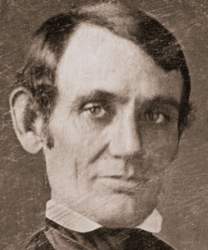Record Data
Source citation
Abraham Lincoln to Mary S. Owens, August 16, 1837, in Roy P. Basler, ed., The Collected Works of Abraham Lincoln (8 vols., New Brunswick, NJ: Rutgers University Press, 1953), 1: 94-95, http://quod.lib.umich.edu/l/lincoln/.
Recipient (to)
Mary S. Owens
Type
Letter
Date Certainty
Exact
Transcriber
Transcription adapted from The Collected Works of Abraham Lincoln (1953), edited by Roy P. Basler
Adapted by Matthew Pinsker, Dickinson College
Transcription date
Transcription
The following text is presented here in complete form, as it originally appeared in print. Spelling and typographical errors have been preserved as in the original.
Springfield
Aug. 16th 1837
Friend Mary.
You will, no doubt, think it rather strange, that I should write you a letter on the same day on which we parted; and I can only account for it by supposing, that seeing you lately makes me think of you more than usual, while at our late meeting we had but few expressions of thoughts. You must know that I can not see you, or think of you, with entire indifference; and yet it may be, that you, are mistaken in regard to what my real feelings towards you are. If I knew you were not, I should not trouble you with this letter. Perhaps any other man would know enough without further information; but I consider it my peculiar right to plead ignorance, and your bounden duty to allow the plea. I want in all cases to do right, and most particularly so, in all cases with women. I want, at this particular time, more than any thing else, to do right with you, and if I knew it would be doing right, as I rather suspect it would, to let you alone, I would do it. And for the purpose of making the matter as plain as possible, I now say, that you can now drop the subject, dismiss your thoughts (if you ever had any) from me forever, and leave this letter unanswered, without calling forth one accusing murmer from me. And I will even go further, and say, that if it will add any thing to your comfort, or peace of mind, to do so, it is my sincere wish that you should. Do not understand by this, that I wish to cut your acquaintance. I mean no such thing. What I do wish is, that our further acquaintance shall depend upon yourself. If such further acquaintance would contribute nothing to your happiness, I am sure it would not to mine. If you feel yourself in any degree bound to me, I am now willing to release you, provided you wish it; while, on the other hand, I am willing, and even anxious to bind you faster, if I can be convinced that it will, in any considerable degree, add to your happiness. This, indeed, is the whole question with me. Nothing would make me more miserable than to believe you miserable---nothing more happy, than to know you were so.
In what I have now said, I think I can not be misunderstood; and to make myself understood, is the only object of this letter.
If it suits you best to not answer this---farewell---a long life and a merry one attend you. But if you conclude to write back, speak as plainly as I do. There can be neither harm nor danger, in saying, to me, any thing you think, just in the manner you think it.
My respects to your sister.
Your friend
LINCOLN.


